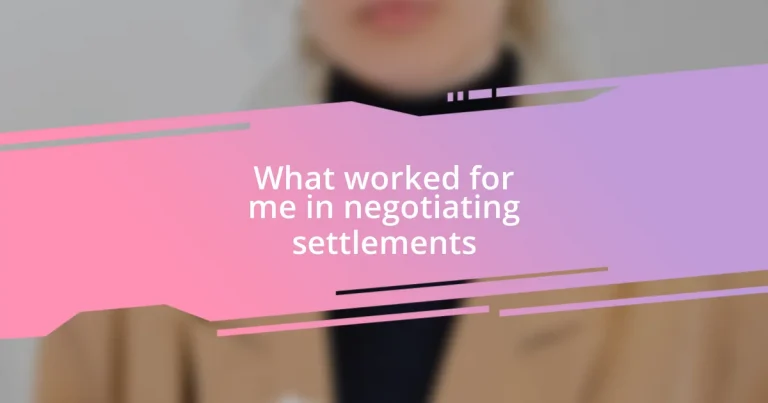Key takeaways:
- Preparation and active listening are essential for successful negotiation, helping to identify goals and foster understanding.
- Building trust through openness, transparency, and consistent communication creates a safe environment for dialogue.
- Leveraging empathy can transform confrontational situations into collaborative efforts, leading to mutually beneficial outcomes.
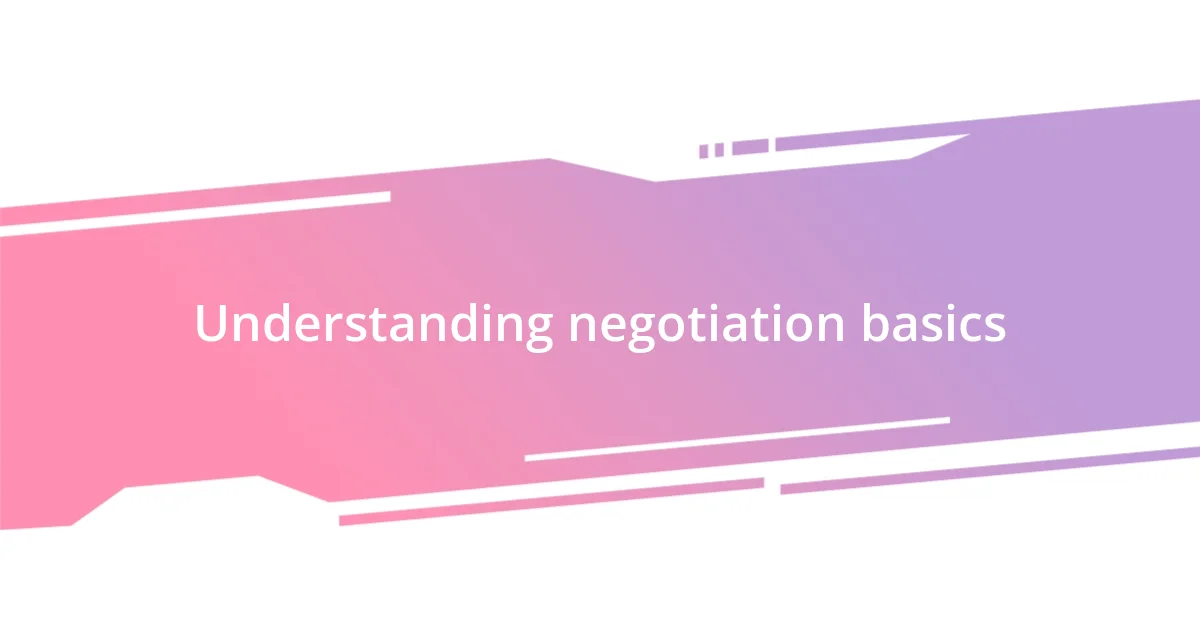
Understanding negotiation basics
Negotiation is more than just a simple conversation; it’s a dance of give and take. I remember my first big negotiation, where I felt overwhelmed by anxiety. Did I want to push for more or settle quickly? This internal conflict taught me that understanding the basics is key, including establishing my goals while being open to the other side’s perspectives.
One crucial element is active listening. I learned this the hard way when I focused too much on my own agenda and missed subtle cues from the other party. It was eye-opening to realize that truly listening can uncover hidden interests that might lead to a more satisfying outcome for everyone involved. Have you ever found yourself talking past someone instead of connecting with them? That might be your cue to shift your approach.
Preparation plays a significant role as well; it’s not just about knowing what you want, but also about anticipating the other person’s needs. I once took hours to research the market value of a service I was offering. When I walked into that negotiation armed with information, it transformed the atmosphere. It felt like I had the upper hand, but in reality, it was about creating a space for an honest exchange. Isn’t it rewarding when both parties leave the table feeling heard and valued?
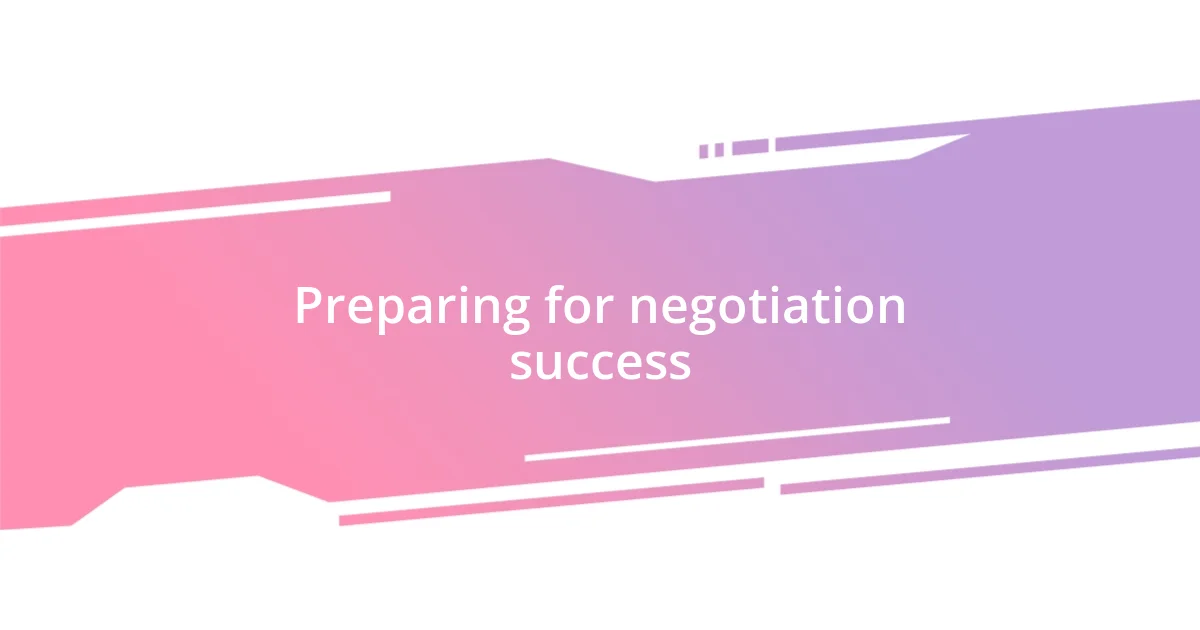
Preparing for negotiation success
Preparation is at the heart of successful negotiations—it’s like laying a solid foundation before building a house. I recall a time when I walked into a negotiation without thoroughly assessing my own needs and the other party’s position. I felt unsteady, and it showed. That experience taught me the importance of preparation; it’s essential to map out not just what I want, but also to predict their goals and limitations. When I did my homework, it gave me confidence as I engaged in the discussion.
To set yourself up for success, consider these key preparation strategies:
- Research your counterpart: Understand their background, interests, and values. It’s amazing how much insight this can provide.
- Define clear objectives: Know your must-haves versus what you’re willing to compromise on. Clarity is power.
- Role-play scenarios: Simulating the negotiation can help identify potential challenges and rehearse responses.
- Prepare your emotional state: Recognize any feelings of anxiety or fear and develop strategies to address them. Being emotionally grounded is vital.
- Create a conducive environment: Choose a location that fosters open dialogue and comfort. Sometimes, the right setting can make all the difference.
Embracing these strategies not only prepares you for effective negotiations but also positions you to approach the conversation with a sense of security and purpose.
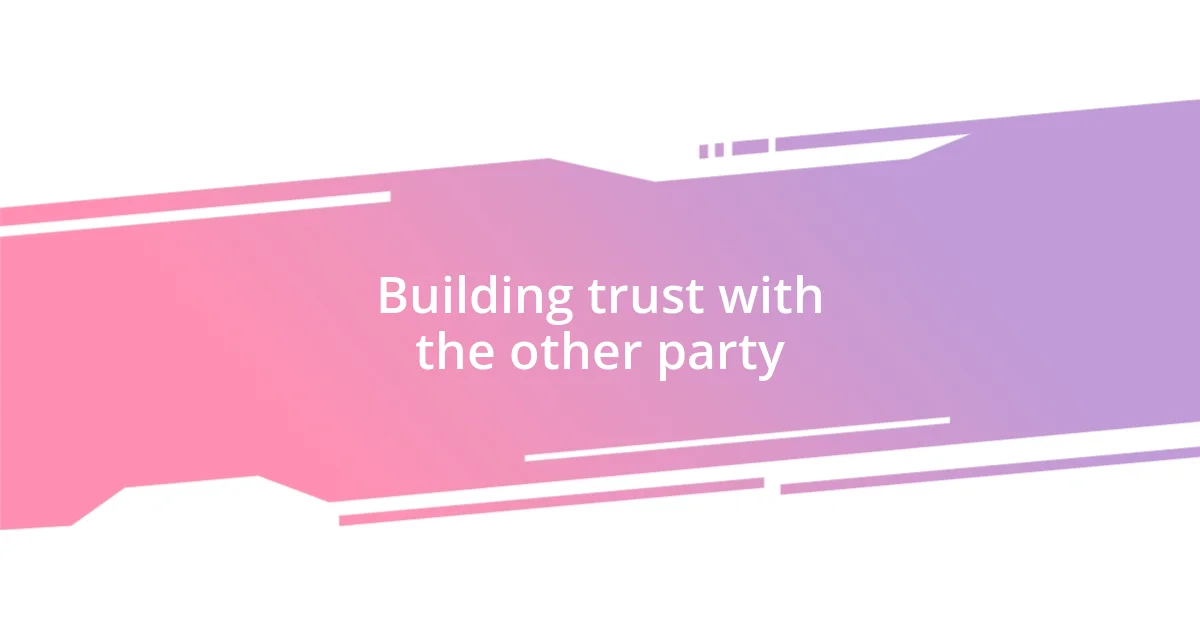
Building trust with the other party
Building trust with the other party is vital in any negotiation process. During one of my earlier negotiations, I realized that a simple act of sharing my thoughts openly reduced the tension significantly. I vividly remember taking a moment to discuss my perspective honestly, which encouraged the other party to reciprocate. It was a lightbulb moment for me—trust isn’t just given; it’s earned through openness and vulnerability.
I’ve found that transparency plays a key role in establishing trust. For instance, in a complex settlement discussion, I made it a point to disclose my limitations regarding what I could agree to. When I did this, I noticed the other party was more willing to reveal their own constraints, creating a safe environment for dialogue. Have you ever felt a conversation shift dramatically simply by being truthful? That’s the kind of connection that fosters trust.
Moreover, consistency in communication helps reinforce that trust. In another instance, I followed up on our discussions promptly and kept my commitments, even when it would have been easier to let things slide. This demonstrated reliability, and over time, the other party responded in kind. Trust, I’ve come to understand, is built piece by piece, and every interaction counts.
| Action | Impact on Trust |
|---|---|
| Openly sharing thoughts | Encourages reciprocation and understanding |
| Being transparent about limitations | Creates a safe environment for dialogue |
| Consistent communication and follow-through | Demonstrates reliability and builds rapport |
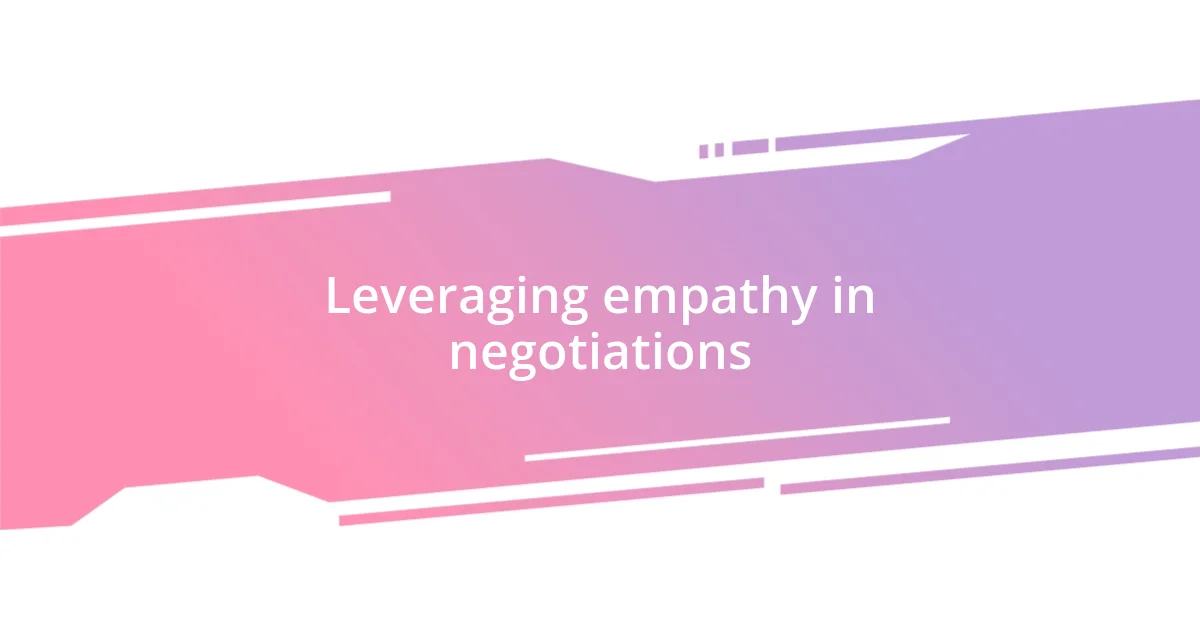
Leveraging empathy in negotiations
Leveraging empathy in negotiations can be a game-changer. I remember a negotiation where I took a moment to listen to the other party’s frustrations. As they spoke, I realized that acknowledging their feelings was just as important as presenting my own case. That moment of empathy opened a door; suddenly, we were no longer just two opposing sides but partners in finding a solution.
Empathy fosters a deeper connection. In one particularly tough negotiation, I made an effort to express understanding of the other party’s challenges. When I shared my awareness of their constraints and how they affected our discussion, I could see their shoulders relax. It was as if my acknowledgment validated their feelings, transforming the dynamics between us. Have you ever noticed how recognizing someone else’s struggle can soften the atmosphere? That’s the kind of shift empathy can create.
The beauty of empathetic negotiation lies in its ability to uncover mutual interests. During a settlement discussion, rather than just focusing on my desired outcome, I asked the other party about their ultimate goals. This approach revealed shared priorities we hadn’t initially recognized. It felt rewarding to see how empathy could align our objectives, turning what seemed like a contentious negotiation into a collaborative effort. Isn’t it satisfying when a simple act of understanding leads to better results for everyone involved?
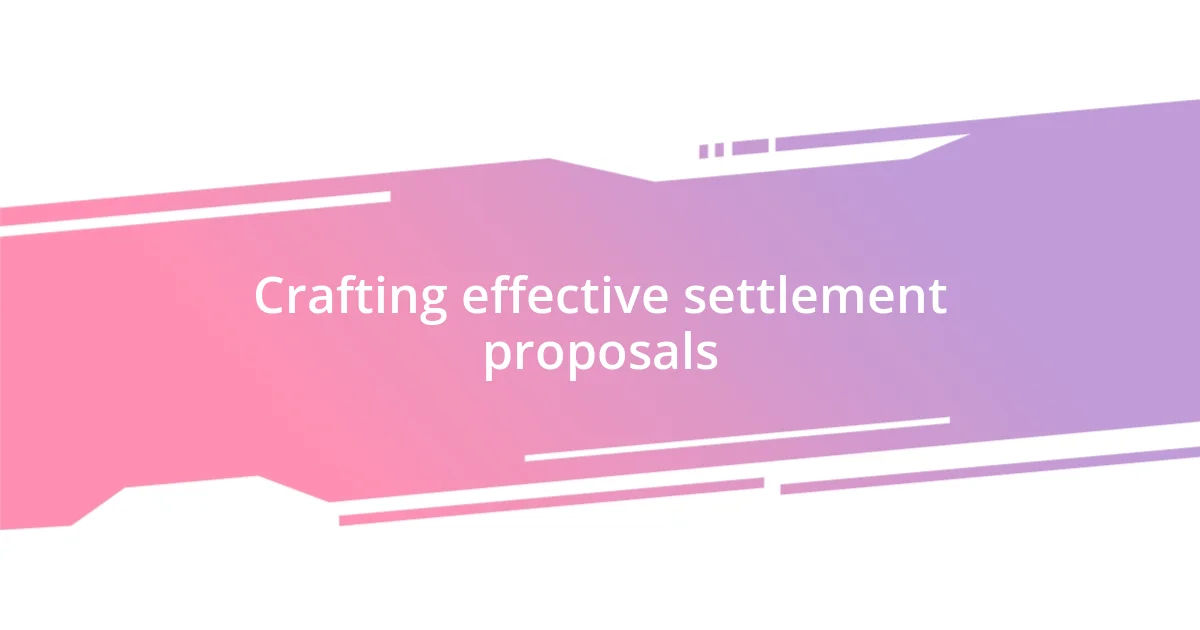
Crafting effective settlement proposals
Crafting effective settlement proposals is all about clarity and precision. I learned this lesson the hard way when I submitted a proposal filled with jargon that ultimately confused the other party. It wasn’t until I distilled my ideas into simple, straightforward language that I began to see progress. Have you ever felt the frustration of your words not landing? This shift made all the difference for me; it connected with the other side and facilitated a constructive dialogue.
I also found that it’s essential to frame proposals within a context that resonates with the other party’s interests. For instance, in a negotiation concerning a business partnership, I took time to highlight how the terms I proposed would positively impact both parties. I recall vividly their faces lighting up as they recognized the mutual benefits. It’s fascinating how looking at things from someone else’s perspective can turn a “me versus you” situation into a “we can both win” scenario. Have you experienced that moment when collaboration suddenly seems more achievable?
Lastly, proposing options rather than a single solution can create a more flexible negotiating atmosphere. I remember presenting multiple scenarios during one particularly tricky discussion, inviting the other party to weigh in on what worked best for them. This not only brought them into the process but also showcased my willingness to collaborate. Doesn’t it feel empowering when both sides can share ownership of the outcome? It’s this kind of approach that often fosters creativity and opens doors to solutions that might not have been considered otherwise.
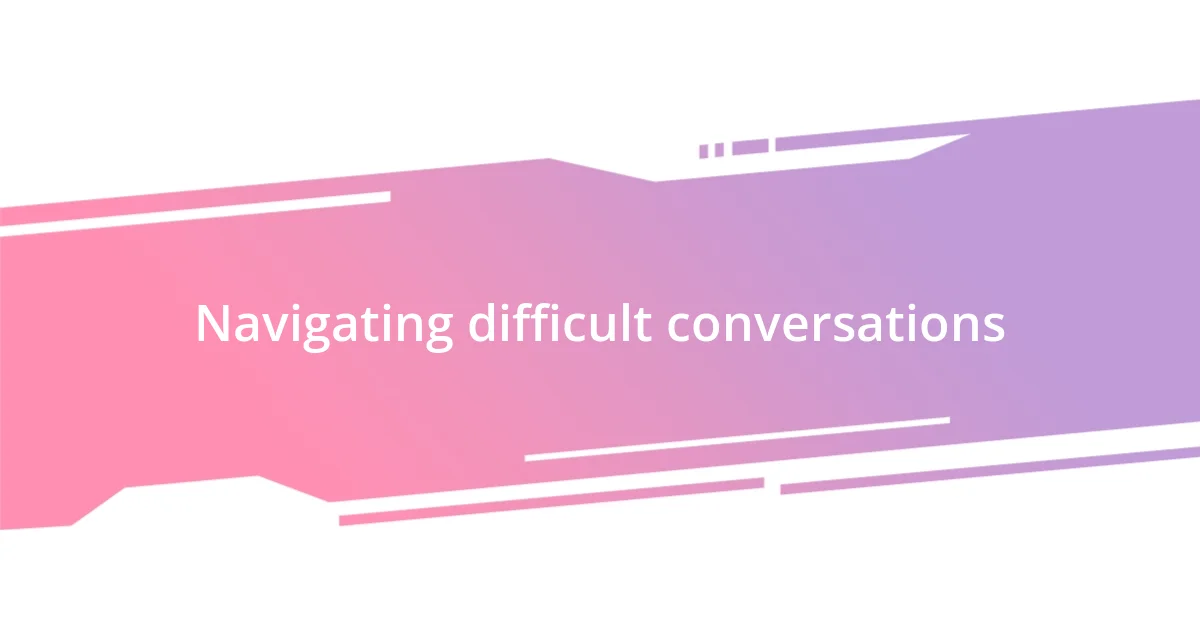
Navigating difficult conversations
Navigating difficult conversations is often where the real progress happens in negotiations. I’ve walked into many discussions feeling anxious, unsure of how the other party would react. One time, I found myself addressing a particularly tense issue head-on, choosing to set aside my nerves and simply be honest. The relief was palpable; when I expressed my concerns openly, it encouraged a similar honesty from the other side. Have you ever felt a weight lift just by speaking your truth?
Whenever the conversation began to veer toward confrontational, I reminded myself to pause and breathe. I vividly remember one negotiation where things escalated quickly, and I sensed the tension rising. Instead of matching that energy, I took a moment to gather myself. This was pivotal; by calmly asking clarifying questions, I transformed the dialogue into a collaborative exploration rather than a combative exchange. It’s interesting how a moment of self-control can redirect the course of a conversation, don’t you think?
Listening actively plays a crucial role in navigating tough discussions. In another case, I focused on truly hearing what the other party was saying while resisting the urge to prepare my next rebuttal. I found that reflecting back what they shared not only showcased that I was listening but also defused the tension in the room. It’s incredible how an attentive ear can bridge divides, shifting the atmosphere from one of opposition to one of mutual exploration. Have you ever noticed how much easier it becomes to find common ground when both sides feel heard?
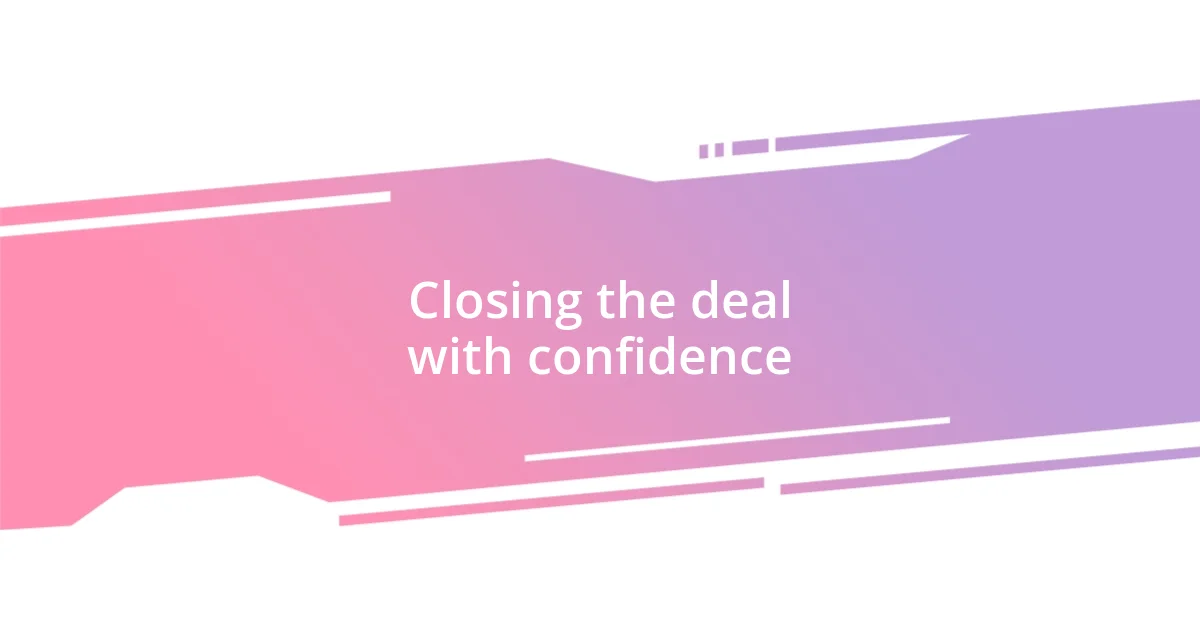
Closing the deal with confidence
Closing a deal with confidence has often been the linchpin in my negotiation experiences. I remember a particularly significant moment when I entered a final meeting armed not just with facts, but also with a palpable sense of assurance. The atmosphere shifted instantly; it was as if my confidence gave the other party permission to embrace the proposed agreement fully. Does that idea resonate with you? There’s something powerful about projecting certainty in your vision that can influence the outcome profoundly.
One technique I’ve harnessed is to visualize success before stepping into the negotiation room. On one occasion, I imagined myself shaking hands, sealing the deal, and feeling that rush of satisfaction. When the actual moment came, I found myself recounting that image, which helped me maintain a clear focus and channel any nerves into excitement instead. Have you ever tried to visualize your goals? This practice not only calmed my mind but also empowered me to articulate my points with clarity and enthusiasm.
Finally, asking for commitment can feel daunting, yet I’ve learned it’s often the missing piece. In a recent negotiation, I hesitated before proposing a timeline for follow-up actions. But then I boldly suggested a date to reconvene. Surprisingly, it rallied the other party, and we agreed on a plan that kept the momentum going. Isn’t it fascinating how a simple request can bring a sense of closure while simultaneously energizing the relationship moving forward? This sort of confidence in asking can transform negotiations from abstract discussions into actionable agreements, solidifying the sense of partnership.












